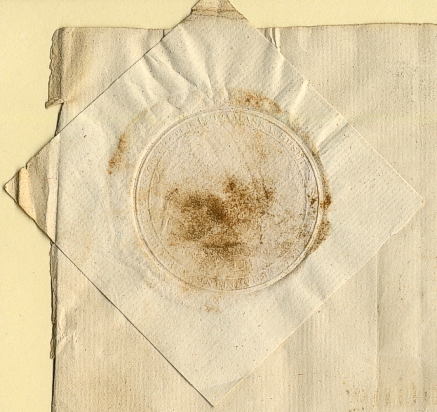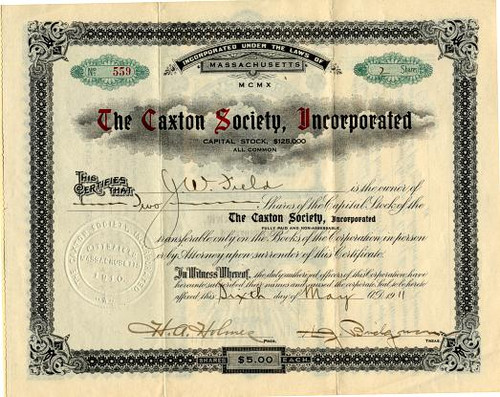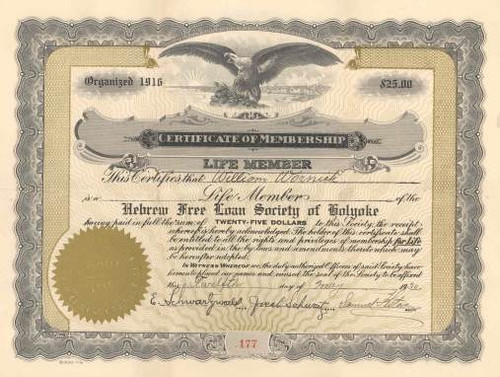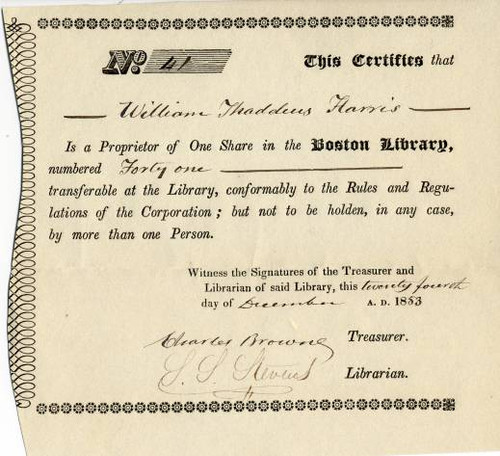Beautiful certificate from the Commonwealth of Massachusetts dated in 1793. This historic document has a seal of Massachusetts and the signatures of the organization's President, Thomas Russell and Secretary, John Avery, Jr. This certificate is over 215 years old. The certificate was issued to Benjamin Sumner Esq. Some signs of wear but overall Very Fine. 
Organization's Embossed Seal The Massachusetts Society for Promoting Agriculture (MSPA), one of the earliest agricultural societies in the United States, was incorporated in 1792. Among the founding members were Samuel Adams (who hosted the first meeting), Charles Bulfinch, Timothy Pickering, Benjamin Lincoln, Christopher Gore, and Benjamin Guild. These were presently joined by the likes of John Adams (the MSPA president from 1805 to 1813), John Hancock, Robert Treat Paine, Elbridge Gerry, Artemas Ward, Josiah Quincy, and other national figures from Massachusetts. The Society's raison d'etre as stated in their petition for incorporation was to join the ranks of the agricultural societies in Britain and America "whose particular business is to make experiments themselves and invite others thereto on the subject of agriculture...[and] to give handsome premiums to the men of enterprise who have by their inquiries made useful discoveries and communicated them to the public." Although the methods have differed somewhat over the years, the Society has never strayed from this original intention of encouraging agricultural pursuits and experiments designed to advance agricultural technology and disseminate information. The first premiums (prizes) offered by the MSPA were $50 for "the most satisfactory account of the natural history of the canker-worm" and $100 for the cheapest and most effective method of eradicating it. Premiums were also offered for the cultivation of wheat and other grains; the improvement of land, including the reclamation of salt marshes; the raising of trees; the greatest stock maintained on the least land; the best vegetable food for wintering stock; the most and best wool from a given number of sheep; the best process for making cider, maple sugar, butter, cheese, flax, and salted provisions; and for the best farm journals, manures, tree plantations, advances in ploughs and ploughing techniques, and farms in general. In 1801, the Society voted to establish a professorship of natural history at Harvard, which served as the origin of the Botanical Garden at Cambridge. In 1813, the MSPA began publishing semi-annually the Massachusetts Agricultural Journal, which was discontinued in 1827 when the publication of various weekly farming journals supplanted the need for a semi-annual one. The year 1816 marked the first Cattle Show sponsored by the Society on their grounds in Brighton designated for that purpose. The Cattle Shows, which ran until 1835, were accompanied by an MSPA annual dinner, at which it was the custom to propose numerous toasts to members and guests, to the delight and amusement of all present. Among the guests in 1832 were the renowned ornithologist John James Audubon and Johann G. Spurzheim, the co-founder of phrenology. The toasts were as follows: "Our scientific countryman, John James Audubon: The flight of the eagle is not beyond his reach, nor the tenants of the poultry yard beneath his notice"; and "Our honored guest, Dr. Spurzheim: He reveals to us the secret import of our 'bumps'; we greet him with a bumper." After 1835, the Society directed more effort at introducing into America improved breeds of cattle, sheep, and horses. They also voted many scholarships and grants to the State Agricultural College (now the University of Massachusetts) and other educational institutions, funded research in animal diseases such as bovine tuberculosis, and supported the Cambridge Botanical Garden and the Arnold Arboretum among many such horticultural stations. At the same time, they continued to offer premiums for the finest examples of farm products and techniques, and became involved in the many county and local agricultural societies and fairs that formed in the nineteenth century, mainly through offering prizes and prize monies to them. In the twentieth century, the MSPA became involved with the 4-H Club, offering premiums to children involved in that organization, as well as funding the 4-H headquarters at Amherst and the junior dairy and poultry departments at the annual Eastern States Exposition in Massachusetts. They continue to fund scientific research at various educational institutions Background from the Massachusetts Historical Society.
Benjamin Sumner (1737-1815) was born and married in Hebron, CT, and later moved with his family to become one of the earliest settlers of Claremont, Sullivan Country, NH. He served many civic positions in Claremont including Selectman, town clerk, Town Meeting Moderator, legislative representative, and civil magistrate.
John Avery Jr served as the Secretary of State of Massachusetts from the adoption of the Massachusetts State Constitution in 1780 until his death in 1806. He was a Boston merchant, distiller and colonial rights activist. . John Avery, Jr. (1786), of Boston, son of John and Mary Avery, was born Sept. 2, 1739. His father was a justice in Boston. John, Jr. (1786), graduated at Harvard College in 1759. He was published to marry (1) Miss Mary Gushing, March 23, 1769, and (2) Harriet Williams, March 21,1799. He was a member of the West Church, and held the office of deacon. Oct. 25, 1774, he was one of the ten persons added to the committee " to consider of Ways & Means for employing the poor Sufferers by the operation of the Boston Port Bill, so called." In 178o, he succeeded Samuel Adams as secretary of the Commonwealth of Massachusetts, and held that office until his decease. He was also secretary of the Massachusetts Humane Society, and was buried on the day of its semi-annual meeting. Their orator, in the midst of his discourse, alluded to the funeral knell which called them to pay their respects to their worthy officer, " an early, active, and important member of the society." Sept. 21, 1793, he was recording secretary of the Massachusetts Society for the Promotion of Agriculture. He resided on " Newbury Street, corner Sheaf's lane," now corner Washington and Avery streets. He died at Boston, June 7, 1806, aged sixty-seven years. " Died on Saturday last, John Avery Esq. [1786] Secretary of the Commonwealth of Massachusetts aged 67 years. " The two Houses of the Legislature, after an expression of their grief for the loss which the public has sustained in the recent demise of the late Secretary of the Commonwealth, Voted unanimously to attend his funeral and to invite Gov. Strong, Lieut Gov. Robbins and the Honorable Council to attend the same." The formation of the funeral procession is then given in detail, and the article concludes as follows : -- " In all the political changes which have taken place in Massachusetts since the adoption of the present constitution in 178o, such has been the sense of all parties of the rectitude and ability with which Mr. Avery [1786] has discharged all the duties of Secretary of State that, if our memory serves us, in all that period he has been annually unanimously elected to that office. In all the social and domestic duties, he was a man of superior excellence."1 John Avery, Jr. (1786). AUTHORITY: Boston Records.
Thomas Russell son of James and Katherine Russell, was born in Charlestown, Mass., April 7, 1749; died in Boston, April 8, 1796. Thomas was one of the first who engaged in the trade with Russia, at the close of the revolutionary war. In the year 1788 he was chosen a Representative of the town of Boston to the General Court, and the same year he was chosen a Delegate to the convention for deliberating on the adoption of the Federal Constitution. In the year 1789 he was elected into the Council of the Commonwealth He was of an old Charlestown family,--(if anything relating to families can be called old in this country, especially in reference to the middle of the last century,) and resided there a part of the year till his death. This estimable gentleman was regarded, in his day, as standing at the head of the merchants of Boston. He lived at the corner of Summer and Arch streets. According to the fashion of the day, he generally appeared on ' Change in full dress ; which implied at that time, for elderly persons, usually a coat of some light colored cloth, small clothes, diamond or paste buckles at the knee and in the shoes, silk stockings, powdered hair, and a cocked hat ; in cold weather a scarlet cloak. A scarlet cloak and a white head were, in the last century, to be seen at the end of every pew in some of the Boston churches. In the latter part of his life, Mr. Russell built the stately mansion in Charlestown, near the old bridge. Though living on the bank of Charles river, on great occasions, before the bridge was built, his family drove to town in a coach drawn by four black horses, through Cambridge, Brighton, and Roxbury. Mr. Russell, at his decease in 1796, is supposed to have left the largest property which had at that time been accumulated in New England. . Warren, John Eulogy on the Honourable Thomas Russell Boston 1796 Warren, John. An eulogy on the Honourable Thomas Russell, Esq. late president of the Society for Propagating the Gospel among the Indians and others in North America; the Humane Society of the Commonwealth of Massachusetts; the Agricultural Society; the Society for the Advice of Immigrants; the Boston Chamber of Commerce; and the National Bank in Boston. Who died at Boston, April 8, 1796. Delivered May 4, 1796, before the several society's to which he belonged.

Organization's Embossed Seal
Benjamin Sumner (1737-1815) was born and married in Hebron, CT, and later moved with his family to become one of the earliest settlers of Claremont, Sullivan Country, NH. He served many civic positions in Claremont including Selectman, town clerk, Town Meeting Moderator, legislative representative, and civil magistrate.
John Avery Jr served as the Secretary of State of Massachusetts from the adoption of the Massachusetts State Constitution in 1780 until his death in 1806. He was a Boston merchant, distiller and colonial rights activist. . John Avery, Jr. (1786), of Boston, son of John and Mary Avery, was born Sept. 2, 1739. His father was a justice in Boston. John, Jr. (1786), graduated at Harvard College in 1759. He was published to marry (1) Miss Mary Gushing, March 23, 1769, and (2) Harriet Williams, March 21,1799. He was a member of the West Church, and held the office of deacon. Oct. 25, 1774, he was one of the ten persons added to the committee " to consider of Ways & Means for employing the poor Sufferers by the operation of the Boston Port Bill, so called." In 178o, he succeeded Samuel Adams as secretary of the Commonwealth of Massachusetts, and held that office until his decease. He was also secretary of the Massachusetts Humane Society, and was buried on the day of its semi-annual meeting. Their orator, in the midst of his discourse, alluded to the funeral knell which called them to pay their respects to their worthy officer, " an early, active, and important member of the society." Sept. 21, 1793, he was recording secretary of the Massachusetts Society for the Promotion of Agriculture. He resided on " Newbury Street, corner Sheaf's lane," now corner Washington and Avery streets. He died at Boston, June 7, 1806, aged sixty-seven years. " Died on Saturday last, John Avery Esq. [1786] Secretary of the Commonwealth of Massachusetts aged 67 years. " The two Houses of the Legislature, after an expression of their grief for the loss which the public has sustained in the recent demise of the late Secretary of the Commonwealth, Voted unanimously to attend his funeral and to invite Gov. Strong, Lieut Gov. Robbins and the Honorable Council to attend the same." The formation of the funeral procession is then given in detail, and the article concludes as follows : -- " In all the political changes which have taken place in Massachusetts since the adoption of the present constitution in 178o, such has been the sense of all parties of the rectitude and ability with which Mr. Avery [1786] has discharged all the duties of Secretary of State that, if our memory serves us, in all that period he has been annually unanimously elected to that office. In all the social and domestic duties, he was a man of superior excellence."1 John Avery, Jr. (1786). AUTHORITY: Boston Records.
Thomas Russell son of James and Katherine Russell, was born in Charlestown, Mass., April 7, 1749; died in Boston, April 8, 1796. Thomas was one of the first who engaged in the trade with Russia, at the close of the revolutionary war. In the year 1788 he was chosen a Representative of the town of Boston to the General Court, and the same year he was chosen a Delegate to the convention for deliberating on the adoption of the Federal Constitution. In the year 1789 he was elected into the Council of the Commonwealth He was of an old Charlestown family,--(if anything relating to families can be called old in this country, especially in reference to the middle of the last century,) and resided there a part of the year till his death. This estimable gentleman was regarded, in his day, as standing at the head of the merchants of Boston. He lived at the corner of Summer and Arch streets. According to the fashion of the day, he generally appeared on ' Change in full dress ; which implied at that time, for elderly persons, usually a coat of some light colored cloth, small clothes, diamond or paste buckles at the knee and in the shoes, silk stockings, powdered hair, and a cocked hat ; in cold weather a scarlet cloak. A scarlet cloak and a white head were, in the last century, to be seen at the end of every pew in some of the Boston churches. In the latter part of his life, Mr. Russell built the stately mansion in Charlestown, near the old bridge. Though living on the bank of Charles river, on great occasions, before the bridge was built, his family drove to town in a coach drawn by four black horses, through Cambridge, Brighton, and Roxbury. Mr. Russell, at his decease in 1796, is supposed to have left the largest property which had at that time been accumulated in New England. . Warren, John Eulogy on the Honourable Thomas Russell Boston 1796 Warren, John. An eulogy on the Honourable Thomas Russell, Esq. late president of the Society for Propagating the Gospel among the Indians and others in North America; the Humane Society of the Commonwealth of Massachusetts; the Agricultural Society; the Society for the Advice of Immigrants; the Boston Chamber of Commerce; and the National Bank in Boston. Who died at Boston, April 8, 1796. Delivered May 4, 1796, before the several society's to which he belonged.








